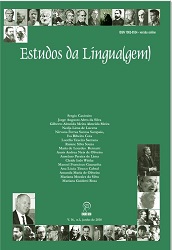Linguistic change and grammarization: the modal verb “dever” in Portuguese of Brazil
DOI:
https://doi.org/10.22481/el.v16i1.4875Abstract
The aim of this article is to analyze the deontic and epistemic values of the modal verb "dever" in Brazilian Portuguese from a functional approach to the modality (see Bybee, 1995, Neves, 1996 and Dik, 1997), and to verify its process of grammaticalization (see Hopper, 1991, Hopper & Traugott, 1993, Traugott & König, 1991). In this work of variation and linguistic change, we use the Letter of Pero Vaz de Caminha, as an example of sixteenth-century Portuguese, the Sermões of Padre Antônio Vieira, as examples of the 17th century, and Dialogue Samples between Documentary and Informant (DID) of the NURC (Urban Standard Speech) Project of Rio de Janeiro, as examples of the twentieth century. It was observed the prototypical use of the verb "dever" as deontic, to have polysemic values and, finally, epistemic value, which shows a cline that starts from the deontic sense to the epistemic one, gaining subjectivity (Traugott & Dasher, 2000) over time.
KEYWORDS: Grammaticalization; Linguistic Change; Modalization; Modal verb “dever”.
Downloads
Downloads
Published
How to Cite
Issue
Section
License

Estudos da Língua(gem) is licensed under a Creative Commons Attribution 4.0 International License.
Authors who publish in the journal Estudos da Língua (gem) agree with the following terms:
The journal Estudos de Língua(gem) maintains the copyrights of the contributions published. These rights include the publication of the contribution and make its content available for free through the portal.







